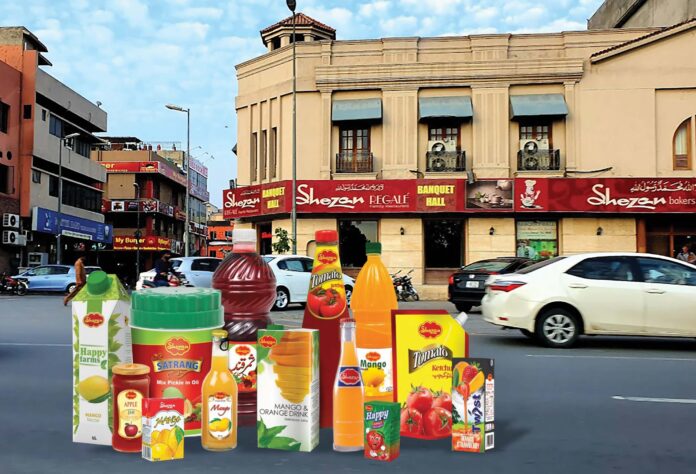In 1975, a simple transaction was about to inextricably change the fates of two business families in Lahore, launching them in a three-decade-long legal dispute over a name — Shezan.
In September 1974, the Bhutto administration declared the Ahmadiyya community non-Muslims, and a number of prominent Ahmadiyya community members, among them leading business owners, prepared to pack up their assets and leave the country.
While the community was no stranger to persecution, for many the constitutional enshrinement against their faith was the last straw. Among those looking to sell their business was Shezan Restaurants and Bakeries. Owned by Shahnawaz Ltd, Shezan was very much a family affair and had been around since the late 1950s. They were pioneers of bringing desi and continental food together with fine dining. They had two restaurants in Lahore, Shezan Continental and Shezan Clay Oven, both on the lower mall.
This was a time when there weren’t many dining options available to a rising upper middle-class. The lower mall was a swanky area surrounded by both government and private offices, which made restaurants that provided good, familiar food in a place with a fashionable ambiance a thriving business. So when the Ahmadiyya family that owned Shezan decided to sell, Chaudhry Meher-ud-Din decided to buy both restaurants from them.
A shrewd businessman who owned automobile showrooms in Lahore, Meher-ud-Din recognised the potential of Shezan. It was a recognisable brand name, had a legacy, and had been built over the years over solid business fundamentals and catered to a specific need. He also knew that inside the restaurant was a bakery as well, which he could separate and expand the business. Meher-ud-Din’s ambitions extended beyond this. He also wanted to acquire a third asset that Shahnawaz Ltd had — the Shezan International factory which produced and packaged products like the iconic Shezan Mango juice, squashes, pickles, jams, marmalades, ketchup etc.
This is where things get a little complicated. While the two restaurants were sold to the Chaudhry family, Shahnawaz Ltd decided to keep Shezan International Factory. The family had put in a lot of work to build up the business and while the threat to their lives and property was very real, they got many reassurances from the government of Pakistan and decided to keep this side of their business.
This resulted in a situation where there were two different entities operating under the Shezan name. There were the restaurants and bakery owned by Chaudhry Meher-ud-Din and the factory owned by Shahnawaz Ltd. The restaurants were in the fine dining and bakeries business, and the factory produced and packaged the iconic Shezan Mango juice, squashes, pickles, jams, marmalades, ketchup and other such products.
For the first few years things ran as smoothly as they could. But then came the trademark dispute in 1988, after which came the lawsuits. After a legal battle that has lasted more than three decades, the Supreme Court of Pakistan (SC) recently ruled in favour of Shahnawaz Ltd — the original owners of the Shezan name. Essentially, the case was less about the right to the name and more about who would get to use the Shezan trademark to expand their business. This is how it all went down.
The story after the sale
Shezan hasn’t had an easy time in Pakistan since 1975. Chaudhry Meher-ud-Din was from a staunchly Sunni family and Shezan bakeries all around Lahore prominently display a declaration of their faith on their windows. Despite this, whenever violence against the Ahmadiyya community rears its ugly head, Shezan Bakeries are often the first targets.
Despite this prejudice, the Shezan name itself has made a name for itself also on the basis of consistency and reliability that makes it stand out. Of course, the Shezan Bakeries we know today are neither high-brow nor fashionable and that has been the product of conscious decisions.
When Chauhdhry Meher-ud-Din had originally bought the restaurants, his eyes had been on the in-house bakeries. At that time, if anything was served from inside a restaurant, sales tax of 16%, value added tax at one percent with special excise duty on top were added to the bill. The bakery items were quite popular which is why Meher-ud-Din decided to separate the bakery from the restaurant which resulted in the prices dropping and demand rising.
Immediately, the bakery was a big hit. They also began to stock their shelves with products from Shezan International. Since it was not very well known that the two entities had separate owners, people thought that Shezan Bakeries were selling their own brand of products. The arrangement was a profitable one for both sides so no one brought it up at this point. The dispute around the trademark actually arose in 1988.
At this point, Shezan Bakeries were becoming a bigger deal than the restaurants which had dwindled in popularity in the face of new options popping up – as tends to happen to legacy family dining establishments. The Chaudhry family decided that it was time to expand the business. Shezan Bakeries all over Lahore had a range of very recognizable products. These included things like their lemon tarts, cheese puffs, bakery biscuits and the like. These products were sold by weight at the bakeries. This meant you would ask for a certain amount of biscuits for example, a staffer would weigh them in a Shezan labelled box, pack them and then you would pay. Those biscuits were then taken home as a tea-time staple or given as a gift by people visiting friends and family.
The Chaudhries wanted to take these popular items and sell them not just at their bakery but outside of it as well. The concept was that the products would be packaged in plastic under the Shezan name and sold at utility stores, supermarkets, and even other smaller bakeries. This, of course, was not cool with Shahnawaz Ltd.
Shahnawaz Ltd had feared something like this would happen. The Shezan trademark was originally under the ownership of Shahnawaz Ltd. However, when they decided to keep Shezan International they registered it under an entity called ‘Shezan Services’ and transferred the trademark to them. For simplicity, we will continue to refer to the owners of the Shezan International factory as Shahnawaz Ltd.
Up until this point, they were the ones packaging products under the Shezan name and selling them ahead. Meanwhile, the Chauhdhry family wanted to expand. On Dec 29th 1988, Shezan Bakers filed an application with the Registrar of TradeMarks seeking registration of the trademark ‘Shezan’ in their name. The firm intended to use the name for its patties, cheese straw, chicken sandwiches, chicken spring rolls and a number of other items. The application was eventually published in the Trade Marks Journal.
The registrar advertised the application in the journal for the purpose of inviting opposition. Shahnawaz Ltd, did so under the Trade Marks Act of 1940.
So finally in 1988 there was a clear chasm between Shezan International which produces the iconic mango juice, jams, pickles, and Shezan Bakers which produces its own line of iconic products including the lemon tarts, sandwiches, and patties. The arguments in court were heated and prolonged.
Over a 33-year period, the original owners Shahnawaz Ltd argued that the trademark Shezan was their house mark since the entity was an internationally known maker of jams and jellies, further contending that due to continuous and extensive use under the label of Shezan, it has become very popular in the country.
They also accused Shezan Bakers of imitating the trademark Shezan for their bakery and confectionery products. In their turn, Shezan Bakers furnished the copy of an agreement dated Feb 19, 1975. The petitioner objected that the agreement had been executed by a third party.
The details and legal technicalities are best left to the lawyers. But the final decision that came from the Supreme Court authored by a two-judge bench, consisting of Justice Qazi Faez Isa and Justice Yahya Afridi, ruled in favour of the original owners — meaning Shahnawaz Ltd the family from whom Chauhdry Meher-ud-Din bought Shezan.
What are the business implications of the decision?
In short, Shezan Bakeries still get to keep their name but they cannot package their products and sell them to retailers in bulk under the Shezan name. So if Shezan Bakeries, now run and managed by Meher-ud-Din’s grandson, is still allowed to keep the name for their bakeries, what has changed?
Essentially, the legal battle was more about the right to expansion using the Shezan name than it was about the name itself. For a long time, in the public eye Shezan the bakery and the producers of the juice and jams were the same thing — or at most a split in an old family business. Because of the added baggage of anti-Ahmadiyya violence against them, there are a lot of urban legends and rumours regarding the ownership but none have quite stuck.
Chaudhry’s family, which owns Shezan Bakeries since February 19, 1975, when the restaurants were signed off by Shahnawaz Ltd to Shezan Services, claims that ever since they bought the Shezan restaurants, any expansions they’ve accomplished are a fruit of their business decisions, their investment, and their efforts, and thus should belong to them, including the name and brand identity that the original owners signed off to them. They also claim that they should not have to change the name because they’ve built this brand over half a century.
Shezan Services (the side Shahnawaz Ltd is one) has no interest in owning the name where it concerns jams, jellies, marmalades and the like. They also highlight that they haven’t copied the name and brand (logo, identity, et al) exactly as the original, and that there are slight differences, especially with reference to the Chef’s mascot icon for their bakeries business.
The case of owning the name and brand Shezan for the bakery and confectionery business, has been going on for around 33 years. The current situation is such that the Supreme Court has recently ruled in favour of Shezan Services:
However, this decision does come with certain limitations, the most major one being that as per the original agreement, the buyers of the restaurants were allowed to operate within territories of Lahore Division only.
This sets huge limitations to the businesses of Shezan Services (owners of the restaurants and bakeries), as they can’t expand into even other cities of Pakistan, let alone take their businesses to international levels.
On the one hand, Chaudhry envisions smooth operations when it comes to running their bakery business on a phone application, which is the logical next step in this digital age. The app they spoke of, by the way, is up and running, and can be downloaded here.
On the other hand, though, one wonders if it wouldn’t be in the best interest of Shezan services to rebrand themselves altogether, so they may continue to grow and prosper.
What else is there to it?
Shezan Bakers had been facing several issues despite the popularity of their products. For one, they have had to counter efforts by zealots who would go around actively urging people not to buy from Shezan Bakers as the business belonged to Ahmedis. They even had to print out and paste a declaration of their faith outside all their bakeries.
Secondly, they were also facing quite a few counterfeiters, who were going around using the name and slightly altered brand identity of Shezan Bakers for similar products.
It is not easy to start, run, maintain, and build a business to heights previously unknown. Chaudhry’s family has invested over 50 years of money and effort into building a bakery and confectionery business that is known for its taste, quality, and standards. Several others, such as Krisco, have tried to replicate the bakery business, but have fizzled out in no time.
Having worked so hard to build a following over half a century, it only felt right to obtain a trademark and register their brand officially, to be known for the right things, and to be able to protect their business.


























Nice Work
A very one-sided article.poor journalism
same
Thanks for the good information, I like it very much. Nothing is really impossible for you. your article is very good.
사설 카지노
j9korea.com